By: Thom Fain, joined by Sonny Onoo
Stan Hansen. There is no foreign wrestler who even comes close to comparing with Kenny Omega when we think about the recognition, legacy, and innovation achieved in wrestling rings throughout Japan.
That was the conclusion Sonny Onoo and I came to, when talking late on the phone one evening about all things puroresu.
The Wrestle-1 tryout program Onoo developed had wrapped a year or so earlier. Between enjoying his time as a grandfather and wrestling memorabilia collector, Onoo still has that itch to help facilitate talent exchange between Japanese and American wrestling promotions, just as he had in World Championship Wrestling (WCW). Kaz Hayashi joined him in several U.S. cities as a trainer and talent scout, with the intention of making the dreams of American pro-wrestlers come true. FiteTV broadcast the series, and at least two of the wrestlers who made their debuts at Korakeun Hall under the tutelage of Hayashi & Onoo have been extended the opportunity to work in Japan this year: Trish Adora, and Cyrus the Destroyer.
Like many young wrestlers I’ve spoken to who are working the indie circuits, Trish and Cyrus have told me their ultimate goal is making it in Japan. Ten years ago, that wouldn’t have been the case – every young athlete was working for an opportunity to sign at World Wrestling Entertainment (WWE).
Kenny Omega changed all of that, with the help of some elite company.
From the start of our conversation, it was evident that Kenny doesn’t take a single day of his wrestling life for granted. Like Chris Jericho – who I spoke with in Issue #10 of Monthly Puroresu – “the Cleaner” had already achieved a godlike status among fans & critics by the time he agreed to our chat… And yet he remained humble, generous, and thoughtful throughout our nearly hourlong conversation.
Monthly Puroresu: Going back to your early days, what was it that drew you to Japanese professional wrestling?
Kenny Omega: I had wrestled all throughout the indies – and when I say all throughout the indies –really, just locally in my local federation in Winnipeg. And, we had a small group of people who studied tapes. And at that time it actually was just tapes, it was wrestling videotapes. Every Friday we would study tapes from 8:00 PM, all the way until sometimes 6:00 AM. And we would just try things. We would take what we saw and then tried to apply it into our matches. And see if we could train ourselves to do what we had seen. And take some of the philosophies and the way that other countries would practice the wrestling. So, one day we would watch a lot of lucha libre, another day we would watch some King of Sports Style stuff. And then we found ourselves watching more Strong Style wrestling, and we all had our favorites. And we would go back to the 1990s, AJPW quite often. But in that time it was early 2000s, so we were watching a lot of NOAH, back when NOAH first became a real powerhouse within the Japanese wrestling industry.
Monthly Puroresu: In past interviews you’ve mentioned meeting with Kenta Kobashi and Naomichi Marufuji, and all these guys early on when you went over there. But what was that reaction or the light bulb moment that made you think, “I’m going to go do this. I’m going to make it happen.” What made you think, “I’ve got what it takes to go hang with these guys?”
Kenny Omega: I never really did think that I had what it took. But the reason I went to the Harley Race camp in Elgin, Missouri was because it was for an opportunity to be implemented into the dojo system of Pro-Wrestling NOAH. So I was willing to kind of forget everything I’d learned up to that point and start as a young boy in their dojo system. That was always the plan. In the end, I was selected by Johnny Ace to go to WWE instead. And I thought, “Well, this is a different kind of opportunity, and maybe this is kind of where my destiny is guiding me towards, so I’m not going to ignore it.” And it was a great opportunity, even though it’s different from where I thought I would end up being.
I did go into the WWE developmental system, Deep South Wrestling at the time, and it wasn’t for me. At that point I had thought maybe wrestling isn’t for me because I was thinking at the highest level, when it becomes more of a business rather than a passion. Maybe I’m not the businessman that I thought that I was, maybe I was never meant to be at the highest level. Things are meant to be micromanaged. Maybe it isn’t what made me fall in love with wrestling to begin with.
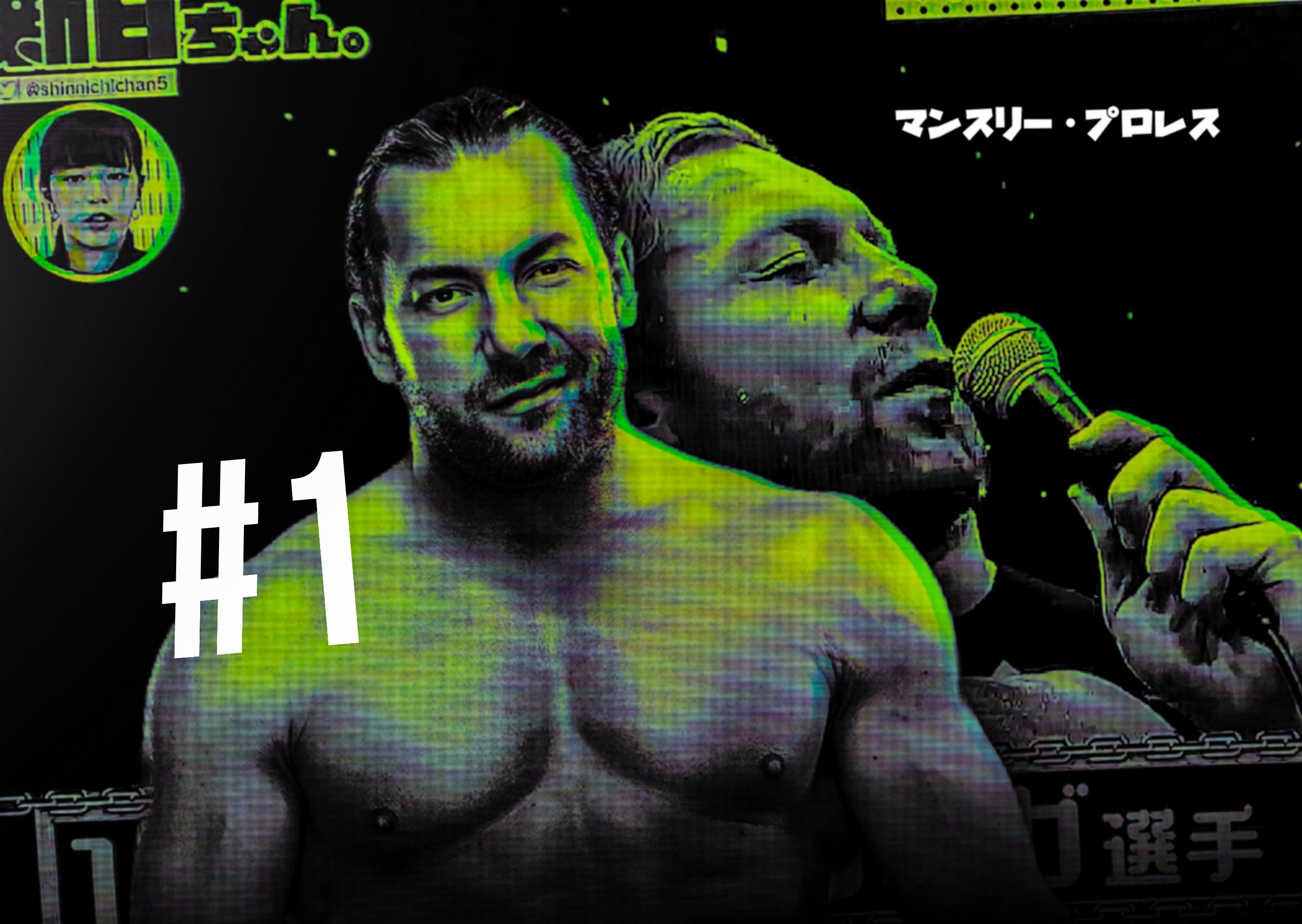
Art c/o Manuel Ish
Monthly Puroresu: You almost felt unsure of yourself. As we all know, even back then as a talent, you felt unsure of yourself going over there.
Kenny Omega: Right. I’ve understood myself going there. I felt unsure of my understanding of the professional wrestling business. I had thought some of the greatest talents, what made them successful was because they were so unique and special athletes in their own way and were in charge of their own character. And all of their wonderful ideas and all of these iconic moments in professional wrestling – you think that they came up with them all. And I think now looking back, I’m sure they did.
But when you go into the developmental system, at least it’s sort of drilled into you, “No, you’re not your own person. You’re our person! And we own you! And you do what we tell you to do! You say what we want you to say. And If you think that you should say something else or do something else, guess what, you’re wrong!”
Monthly Puroresu: They pigeonhole you into thinking, “This is what we think you should be and that’s what you’re going to be.”
Kenny Omega: Exactly. And my worry at that point was if this is what wrestling is, or if this is what it’s become, maybe this isn’t what I fell in love with. Maybe this isn’t my childhood dream anymore. Maybe I just need to consider doing something else. Or just give it up.
Monthly Puroresu: And you didn’t. And we’re all glad you didn’t! Those Long Beach shows in 2017, 2018 and 2019 as fans, we felt like we were part of a movement that you guys were starting. It really felt like a kind of anti-monopoly revolution. So at what point did it click? Could you walk us back a little bit from meeting Kenta Kobashi, Marufuji and KENTA, and being unsure of yourself to taking advantage of that system, and Pro-Wrestling NOAH. And taking advantage of your opportunity as a stranger in a new land?
Kenny Omega: So before I went out to explore this opportunity with WLW at Elder, Missouri with Harley Race. It just so happened I was lucky to be on this newsletter that was handed out to all NWA participants. That there was this camp. In fact, they were going to team up with Pro-Wrestling NOAH, and that there was going to be this opportunity. And so for me, that was really exciting because all I’d wanted to do was go to Japan. And I’d felt that whatever style and whatever it was that I wanted to get out of wrestling, I felt like I could find out there. Because I was keeping up to date with was happening in North America but I wasn’t invested in it. It wasn’t interesting for me.
So when I went out there, I really wanted to take advantage of feeling what it would be like to be a young boy in the dojo system. I didn’t want to go into that camp feeling like I had an advantage over everyone. I didn’t want to go into that camp feeling like I’m in better shape than anyone or more talented. I wanted to go in looking at everyone as competition. Because I wanted to compete against everyone else and be one of the few that were chosen to go into this dojo system, in Japan. I thought that would be maybe my true calling. Of course, as you know, things didn’t work out that way. But meeting Kobashi for the first time was really cool. Our first interaction with one another was when he was watching one of my sparring match-ups with one of the talents from Harley Race’s camp.
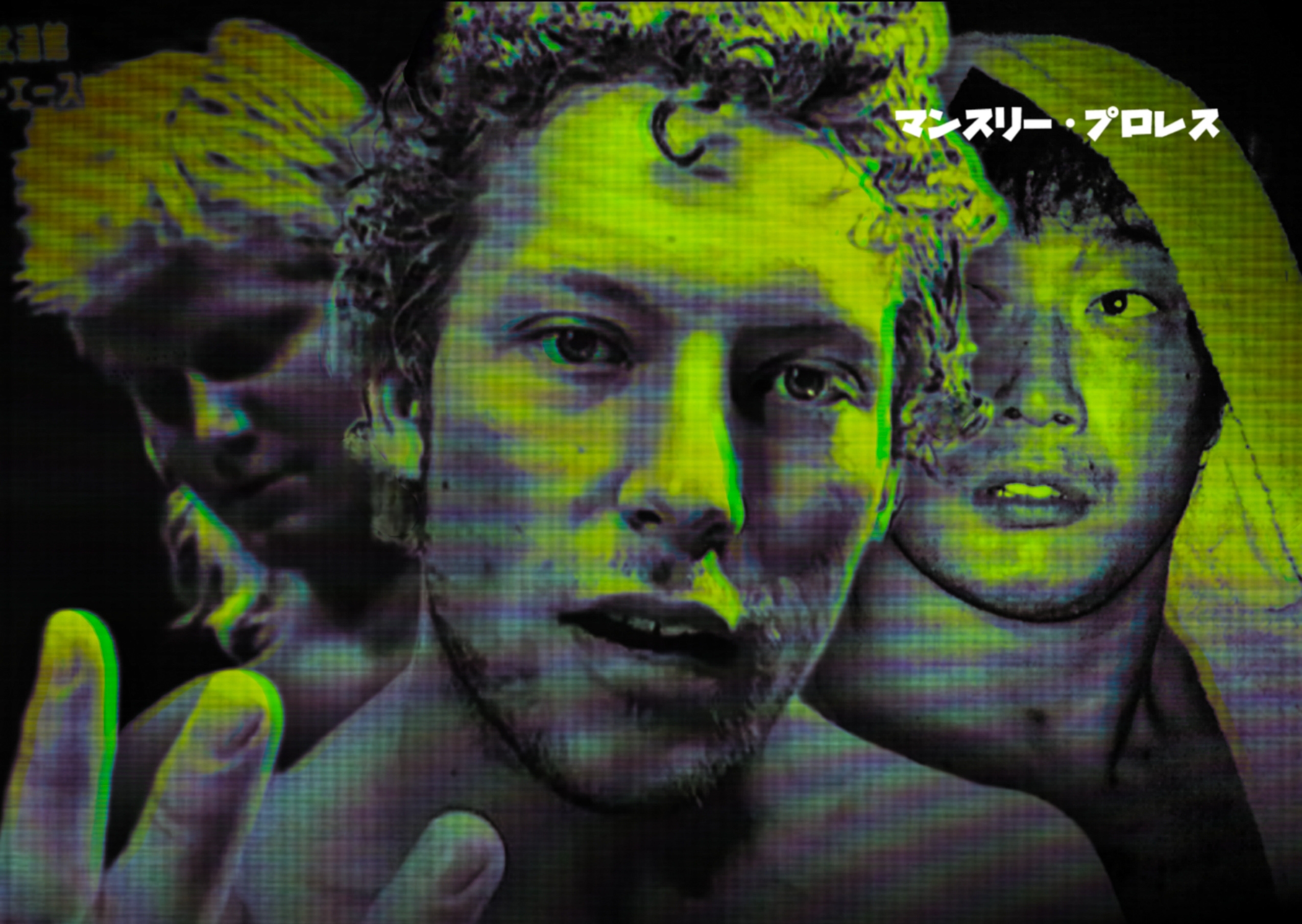
Art c/o Manuel Ish
He had jokingly said with Johnny Ace, when he’d showed up, he had said like, “Oh I’ve picked this guy already.” Johnny’s like “Whoah! Not so fast. Maybe we want him over in WWE.” And they’re joking around like, “Oh, this is a great taste of things to come!’ Like, I’m glad that they’re making jokes about me and already singled me out in a positive way. That was my first sort of semi-interaction with Kobashi. And then Marufuji and KENTA were real hands-on while they’re there as well. And I remember Marufuji gave me a real good piece of advice. Just because he’s a real nice guy. Not because I begged him for it, and it wasn’t a half-hearted answer.
He came to me and he said “You’re real fast in the ring. You’re one of the fastest guys I’ve ever seen. But you’re always fast.” And he said “Sometimes being fast all the time, fails to tell the story that you’re trying to tell. So, figure out ways and figure out the moments when you should slow it down.” Just a super small conversation. But I mean, it was real cool that he went out of his way to tell me that. At that point too, I was on a kick. I was trying to use any advantage that I could to stand out.
And, I had known that “Okay, I probably have better speed and better endurance” because there were guys that were big. There were some big bodybuilder type dudes. And I thought “Okay, I’m not going to look bigger than anybody. I’m not going to look stronger. So what can I use that can help me stand out amongst everybody?” And I thought “I have my speed. I have my conditioning. I try to do a good job of making everyone else’s moves look good.” So I used everything that I knew that I had as a tool.
Monthly Puroresu: You keep clean. A clean diet, a clean workout.
Kenny Omega: Even at that point, my goal was to look like an athlete. And my goal was I wanted to mix it up with NOAH juniors. It was funny too. Everyone was like “Hey, who do you want to wrestle? List your top three!” And I was like, now that I’m thinking back, I probably sounded such a kiss-ass.
“Well, I want to wrestle Marufuji. I want to wrestle KENTA. And I want to wrestle Kotaro Suzuki.”
They’re like “Okay, you want to wrestle KENTA and Marufuji huh? Sure you do.”
And then when I said Kotaro Suzuki, they were like, “What?! You want to wrestle Suzuki? Why?”
Everyone starts laughing! And I was like “No, I love your juniors. I want to work with you guys. That’s the dream”. As you know, in the end I went over to their system and then I came back and I thought “Maybe I’m done because if wrestling at the highest level is this, then maybe that’s not me.”
But then I thought, “I’m going to go and visit my friends that I’d met in the developmental system who live in the east coast. And while I’m there maybe I’ll do a show or two. We’ll just see how it goes.”
I visited my friends that I had made down in Atlanta and ended up doing a couple shows, and they went really well. They wanted me to come back. One thing led to another.
I got an opportunity to go to Japan and actually one of my goals before even going to Harley Race’s camp was if I could go to Japan and fly myself out and just show up to places and say “Hey, I have my gear. Can you use me?”
My dream was to actually be selected. I wanted a promotion to want to use me. I wanted a promotion to say, “Kenny, we think you’re good enough. We’re going to fly out. And you’re our guest.”
That was my dream – and I got an opportunity to do that with DDT. They were willing to bring me out and put me into their series of shows in the summer and I was able to start something special with Kota Ibushi and do some pretty cool matches there. They gave me a couple of title shots while I was there.
Monthly Puroresu: What was it like culturally trying to fit in? You’re in DDT, which as Sonny and I have talked about, is the sports entertainment brand in Japan. At least in our minds – as writers and historians, the people trying to help catalog this – there’s Sports Entertainment and there’s pro-wrestling. Would you have been happy staying in DDT? How did you find your footing there?
Kenny Omega: Upon seeing my first taste of what DDT was, I’d seen that it was on the extreme end of what Sports Entertainment embodies. because that’s when they were doing like things using monkeys in ladder matches and all that type of stuff.
Monthly Puroresu: Did you wrestle Yoshihiko, the blow up doll?
Kenny Omega: Yes. Many times.
Monthly Puroresu: Yeah. I thought I had seen one or two clips.
Kenny Omega: Yeah. Many times. Maybe about 10!
Monthly Puroresu: That’s an art form. You’ve got be real pro wrestler to be able to do that. We talk about Ric Flair making anybody look good…
Kenny Omega: That’s the challenge. Sometimes when you look at these types of real specialized matches. There are moments when you watch it and go “Okay, it just looks like a child playing with a toy.” And that’s when it takes away from the immersion of the performance and the immersion of the match.
One thing that I felt myself and Kota Ibushi did really well, is that at least for a moment in time, just for the 10, 12, 15 minutes that the match lasted. I really felt that we could make people forget for that small pocket of time that this thing wasn’t actually alive! And that we were actually struggling to defeat it! That really helps for the fun of the moment. When you’re in the DDT universe, you treat Yoshihiko as though it’s a wrestler and not just any wrestler, but pretty strong one too.
Monthly Puroresu: Did you have conversations with Takagi-San, and help come up with angles?
Kenny Omega: Yeah. This is during a time when the indies were very underground. Very unknown. There were people able to translate to create a more easy experience for foreigners, if you were in New Japan.
But on the indies, there wasn’t anybody that could speak English. You’re really a small fish thrown into a gigantic pond of unfamiliar things. Luckily I did meet one of my friends there, Michael Nakazawa, who was always DDT. And he went to a college in Alabama. So he had a very good grasp of the English language. His job wasn’t to be a translator, but he knew English, so he really helped me when I was out there.
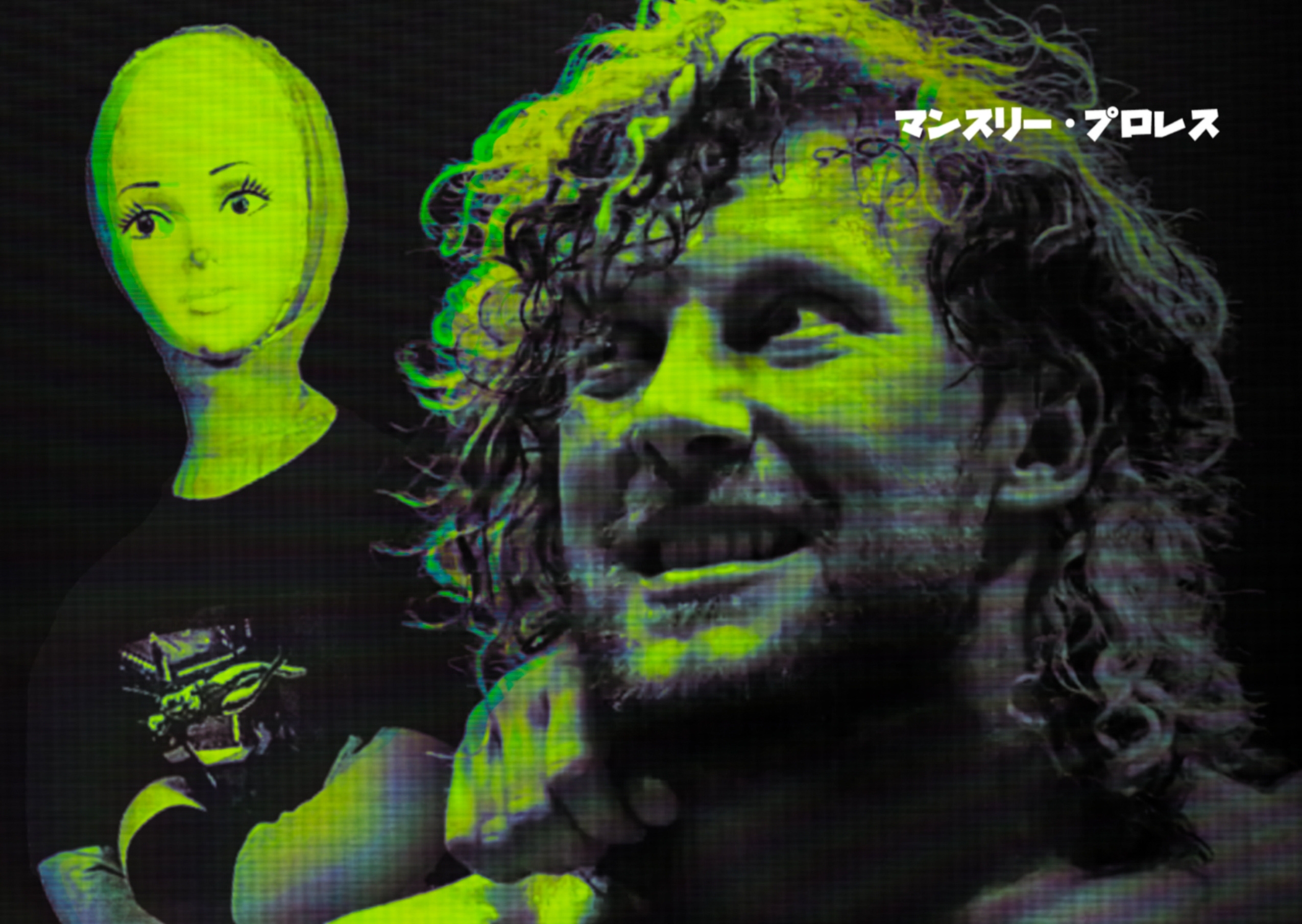
Art c/o Manuel Ish
Monthly Puroresu: Would you say it’s important to find some allies as coming from the perspective of a new gaijin? Like, finding allies when you get there, making sure that your ideas for matches and angles can get translated up to the top?
Kenny Omega: That’s very true. I think at that point too, there was no real feeling that the roster or many of the rosters needed to learn English either. I’d always felt that the only way for me to thrive here is to go out of my way, and take the steps needed to learn this language. I was also torn within myself because I thought “Well, this was the dream and this should be where I can say I can pack it in.” If DDT never wants to bring me back, I need to accept that, because in Winnipeg there’s not many outlets to make it anywhere. We don’t have connections.
We don’t have anyone’s family. No one’s father, grandfather, brother, or whatever. No one’s willing to vouch for us to get us somewhere else. Not only that, but if you go someplace, chances are wherever it is that you go, your travel expense is going to be very high. Not just your hotel, but either the gas or the flight. So you need to be way more worth it for the promoter. And he has to be very convinced that you’re going to be able to make him that money back, for him to want to bring you back. Winnipeg, even though it was very central and we do have a major international airport, it was still very geographically optimal to be living there and actually trying to make it out of there.
I thought if DDT doesn’t want to bring me back, maybe I need to really start thinking of changing careers, which was fine because it was always a promise I made to myself that my biggest goal is to make it there. When I did and I had my match with Ibushi, it was my second match out there. The two-out-of-three falls match, it went on to win the independent match of the year award.
Monthly Puroresu: Was that the inflection point where the light bulb went off?
Kenny Omega: That’s when I started to get hungry again. I was like “Oh my God, we did this! I did this! I was a part of this!”And at that point there was no plan to ever bring me back. I emailed Nakazawa and said “Hey, is there any interest to maybe bring me back? I’d really love to come back?” Then I waited a month and try to do it again. Wait a month, try to do it again. And finally he said “Oh, it sounds like they’re going to bring you back. They’ve got an idea.” So I went back, not knowing what I was going to do. And they had said “Hey, we’ve got this cool idea. We think that we need to have the rematch between you and Ibushi. And let’s try to make it bigger and make it better. Let’s try to one up the last match that you did.” The plan there was for me to lose again. And then that would have been my second trip and I would’ve been able to hopefully have another great match with Ibushi. And then I would have gone home and that would have been it. And as we built kind of towards the second matchup, I’d spent a lot more time with Ibushi. Hanging out and we became real good friends and we thought “Hey, what if we changed the narrative a little bit?” Instead of another rematch of our singles match, as we didn’t think we could top it.”
Monthly Puroresu: Coming up with those narratives, are you in a room? In a gym? Bouncing ideas off each other, writing things down? What does that look like for a gaijin?
Kenny Omega: We actually would hang out all the time, with a number of people. And we had this real nice family and this one, man, the father was a Buddhist priest. And he was very well off and he had a ton of connections and we would sit in these huge palace looking places. They would have this incredible food. It was really cool. And it’s funny how when I reached the height of my career in New Japan, I never found anything else like that. That was a once in a lifetime experience to meet these guys. We would hang out and there’d be just random wrestling on one of the TVs in the room. And their kids were playing with their wrestling merchandise. In this huge room with food everywhere. And just for lack of anything else to do. We’re just like “Let’s just talk about what we got to do.” Which is work towards this match and how are we going to pull it off? Because our first match together between Ibushi and I, was a falls count anywhere, two out of three falls match. And they wanted us to one up that. How do you one up that? How are we going to make it crazier? What is it that we’re going to do to really hook people into this thing in the end?”
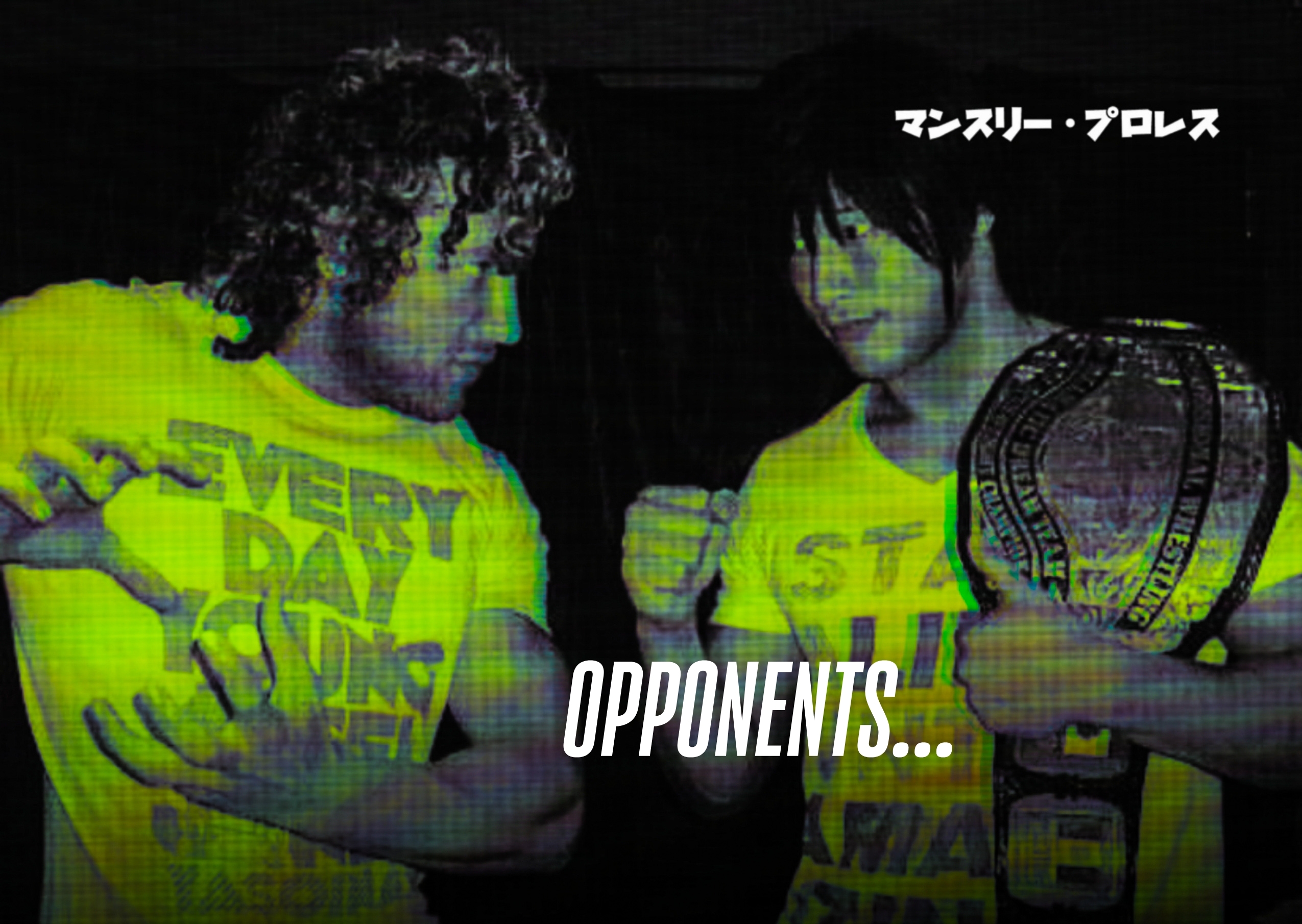
Art c/o Manuel Ish
Kenny Omega: Anyway, we came up with the idea, let’s try to convince Takagi-san for us to be a tag team instead. And both of us thought Takagi-san is never going to go for it. So we went and presented him with the idea that “Hey, if you give us a chance to be a tag team, instead of continuing this one-on-one feud together, we promise that we will show you something that you’ve never seen before in tag-team wrestling. And we’ll revolutionize what tag team wrestling means.”
Monthly Puroresu: Did you have an idea how you would actually deliver on that promise or just making it?
Kenny Omega: No. Ibushi was like “I’d put my career on the line that we can make it happen.” And Takagi-san said “You’re not putting your career on the line! Shut up! Don’t go that far. If you really that passionate about it. Sure. We’ll give it a shot, test it and see if it’s okay.” I remember we came up with a couple double teams and we had real good natural chemistry together and it felt good and it was on a random house show. A show away from Tokyo. And we thought, “Well, we might be onto something. But we don’t have that one thing that is really going to convince DDT to stick with this.”
Ibushi being Ibushi, he’s got all these strange hookups and he has like secret dojos that he trains in.
He said: “Come to the secret dojo and we’ll work on something.” That’s where we came up with some of our more famous double-team maneuvers; that’s when we came up with “The Golden Shower” which is a double 450 off the top rope. I think it was less impressive that we were able to do a double 450 but that when we did it, we naturally jumped at the same height we naturally had. We naturally had the same spin speed, the way that we talk as the exact same. It just looked too pretty. And when we saw the video of us sitting on like a training dummy and us hitting it from multiple angles and distances, we thought, “Oh my God, this is what we need to bring to the table.” This is what it is.
Monthly Puroresu: A lot of trial and error up to that point. Bouncing ideas in the secret dojo, where is that in Tokyo? Some secret underground spot?
Kenny Omega: No, it was in Chiba. So it was a little outside of Tokyo.
Monthly Puroresu: So you guys were in Chiba. You know a little bit of Japanese at this point and then you guys are bouncing ideas off one another. Nakazawa was coming in and out. I’m guessing he’s kind of hanging out. How much time did it take before you realized: this is it, when it all clicked?
Kenny Omega: That’s such a good question. I feel we would go to that dojo for between three to four hours. And we would work on stuff that we were currently doing. We’d work on stuff that maybe we wanted to do. There was a lot of stuff that was left on the cutting room floor, because it was so dangerous. Ibushi, he’s a nut job! Like real insane stuff. Like if we didn’t do it on two double stack crash mats, I think there’d be a fatality by now! And we thought this can’t be it. This can’t be how we’re going to revolutionize tag-team wrestling. It’s just not viable. Someone’s going to get hurt and that’s it. So when we finally came up with the Golden Shower, when we finally came up with the Cross Slash.
When we finally came up with those we were like “Oh, these are real pretty, and if we can hit this, then we might have a very strong case to continue this thing and push it as far as it can go.” And I remember being so nervous the day that we were going to debut this move because no one knew what we’re going to do. Takagi-san didn’t know where we’re going to do. All we had said was, “We’ve got the finish and it’s going to be something special.” It’s do or die
Not only did I feel like this was subsequent trips on the line, this was the entire tag-team angle on the line. This is everything, all the hard work that we put into the dojos. All of this was on the line and it boiled down to one opportunity to do this one move that we had worked on. A number of times, but as you guys know, it just takes one small thing to slip up. And even if we did it, but the timing was a little off, I feel like it wouldn’t be as easy to sell because doing a move off the same buckle. I mean, it’s always going to be impressive. It’s always going to be risky. But the thing was, it had to look pretty and it had to look like something that no one’s ever seen before.
We were lucky enough that when push came to shove, we hit that move perfectly, in our tag-team title match. And in that year, which was 2009, that match also won match of the year, which is incredible. Not only did it prolong the tag team, but it also bought me more time again and sucked to always feel like I had to do. And, that was the point too when I always went back into the think tank. It’s like, “Oh my God, we did it. We pulled it off. We’re a tag team now Ibushi and we’ve won the belts.” I think that was the first time foreigners had won the belts as well. So I’d felt like I’d really done more than I’d ever imagined in professional wrestling.
And I’d done more than I ever imagined in Japan. If for whatever reason DDT said, “Thank you for your services. You know, you’re going to lose in your first defense and we’ll have to say our goodbyes,” I would have been cool with that because I had done more than I ever dreamed possible. But I still wanted to try to do what I could to prolong my tenure with DDT. So I went back home and just being in the think tank, “How am I to convince DDT to bring me back next time?” There’s never any job security.
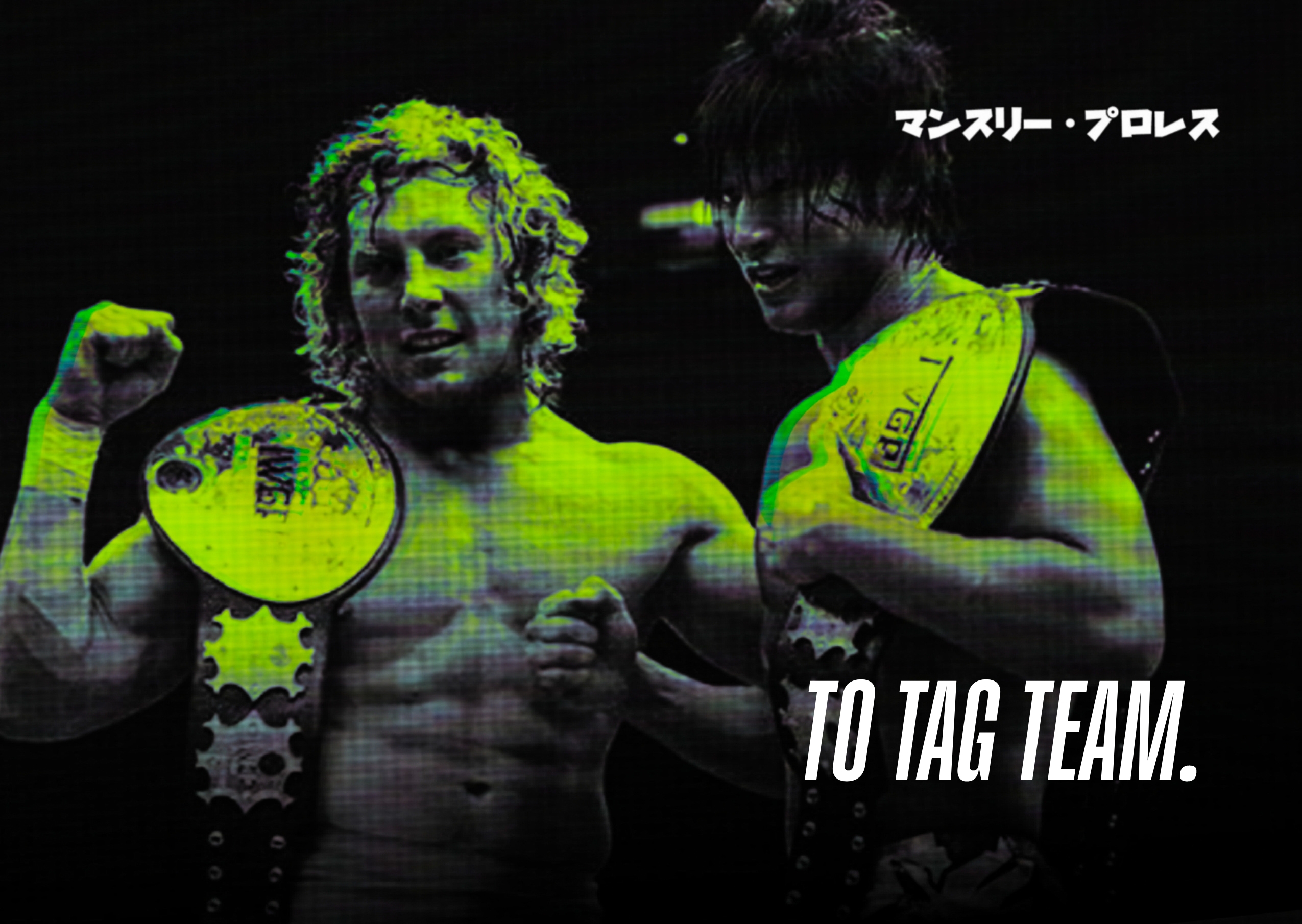
Art c/o Manuel Ish
Monthly Puroresu: I can’t imagine putting your body on the line in that manner. You’re out in a foreign land, trying to assimilate to the culture, putting your body on the line? And, with all the concussion research that was happening at that point in time. And you made it, you extended the contract. What was that moment and what was that conversation like after that? Because you have put everything on the line and invested in yourself.
Kenny Omega: I think there was an epiphany across the board, within the company. Even an epiphany amongst Ibushi and I. Where it’s like, it’s so much different when you hit a move that you hit in a dojo on a place that looks like Superman’s family’s farm. To hit it when you knew you had to.
Monthly Puroresu: There’s no safety net, you know what I mean?
Kenny Omega: There’s no way we’re going to slip or miss time and then go, “No, wait guys, we’re going to do one more and then go back up and do it.” You know what I mean? It was then or never. We made it happen and we had thought we really do have something special. It’s almost like without us telling each other, maybe there’s even a little bit of doubt between the two of us. Are we really that special? Do we really have this chemistry that we think that we do? Or are we trying real hard to fit a square peg in a circular hole?
Monthly Puroresu: Well to add to your story… I don’t know if anybody has told you, Kenny, is what you have done is different. Others have gone to Japan before you but they were always invited. They were already a name in the U.S. And they went over there with New Japan. There aren’t too many guys who have done what you have, the path you took is pretty unique in itself. Because you went there to a smaller company, DDT, and I think it was good because you had guys like Ibushi who was trying the same thing and same aspirations as you did. And you guys were so hungry, but one of the things I want to say as my observation from listening to your story is that one of the most important things that I want to get the people who follow in your footsteps is that you immersed yourself in the culture.
And the most important thing that I take from what I tell people all the time, and one of the things you learned in Japan, is a reason why people in Japan wear masks, and we talk about the mask and the coronavirus and all that. It is because people think “I’m not worried about me. I’m worried about you.” It’s, looking after other people and those around you. That concept is foreign to Western culture in general, certainly in the United States.
But you have taken, and it doesn’t surprise me why you were successful because of the attitude you went over there and said “Here I am, I’m gonna do my best. I’m gonna work my ass off.” A lot of people can do that. But you literally immersed yourself in the culture. Everything from the food, everything you have done, you put yourself, although you wanted to be successful, that was your goal. But you put yourself almost second to get surrounded by good people. And I think your attitude is what made you great. And reason why you’re successful.
Kenny Omega: I’m trying to put myself back into my shoes from 2008. I really feel like Ibushi and myself – You know, I saw something special in him and he possibly saw something special in me. And we latched onto each other a little bit, because we knew that we had something different to show the wrestling world. And different isn’t necessarily always a good thing. But in this case, we had thought the way that we approach wrestling, we have such a deep and profound respect for everyone that came up before us, especially in Japan. However, we weren’t afraid to go out on a limb and try these new things.
The things that made DDT so famous, which is for some of the most ridiculous styles of matches you’ve ever seen. So if we had an opportunity to wrestle with Yoshihiko or wrestle on a campsite or wrestle Mecha Mummy or anything like that.
We’re going to make of it, whatever it is that we could and use our talents to try to make it as entertaining for our fanbase as possible. So like when a lot of people, I see some arguments online or things directed to me because unfortunately it turns up on my timeline. But it’s like, “Kenny, you should be ashamed of yourself for what you did in DDT.”
And then I’ll have people trying to defend me saying “Kenny was just trying to do his job and accept the paychecks.” That was all part of the process. I am not ashamed of what I’ve done out there at all. All of that worked into becoming what I am today because I really firmly believe, and I’ve said this in a lot of New Japan interviews too, DDT allowed me to train to become a complete professional wrestler. Because wrestling, isn’t just one style. It’s never going to be one thing. It’ll never be restricted to the small little box where it’s “You do this or that’s it, you’re out.” Because you’re going to be forced into situations where you might wrestle somebody that has a different style than you. And in those cases, how is it that you’re going to make that match stand out? How is it you’re going to make that match special? If you have no skillset beyond the one thing you know chances are that match, isn’t going to be anything special. I wanted to pride myself as someone who had a tool set deep enough so that I would have something for every situation.
That’s why I think Ibushi was able to get to the point where he is today. Perhaps that’s also the reason why I can do what I can do. Not only on the indies in Japan, but in the majors in Japan, and the majors in Mexico, the majors in the UK and even on TV wrestling in America, which is so different. It’s completely different in its own right. So again, when I look back at DDT, it’s some of my fondest memories of wrestling.
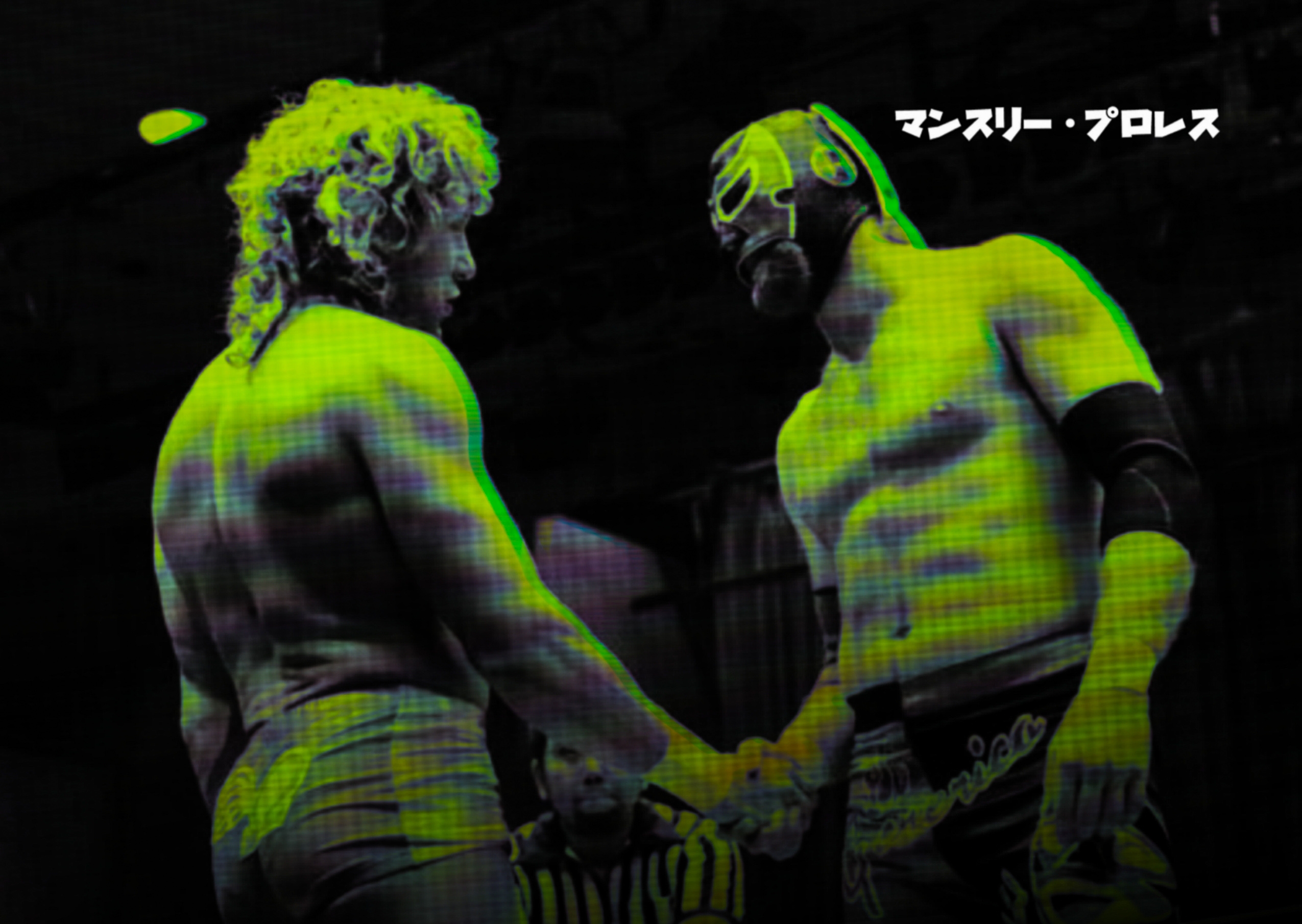
Art c/o Manuel Ish
Monthly Puroresu: It forced the younger guys to challenge themselves. Not only get outside of your box, culturally assimilate to what’s going on in the dojo, which is totally different than WCW Powerplant or WWE Performance Center. So you’ve gotten that aspect. You’ve got the dojo culture, eating chanko. And you’re within your community and finding a Buddhist family to hang out with. Challenge yourself culturally, but then wrestling wise, making sure you’re always pushing the boundaries and getting outside the box. What tips do you have to for conditioning guys? Taking your body because it’s such an extremely demanding thing. And then to go outside of the box and be safe to push yourself beyond your personal limits… What kind of tips, or if you go back to 2008 or 2012, when you, when you won King of DDT Tournament. Because you know, the path is going to be long, right? At that point, you’ve got to be like, “Well, now I’m on something, I’m making a little bit of money, but I have to preserve my body.”
Kenny Omega: Absolutely. So the sad reality for everyone is that they have to accept some of the tools that they’re given and some of the tools that they have no choice, but to use and deal with them. Sometimes get a hand and that’s the hand that you deal with. Wrestling is very demanding on the body. As you know, the types of bumps, you have to take, the schedule that you’ll have to endure if you’re going to do it full-time. And some of us, unfortunately, no matter how athletic you may or may not be, the type of punishment that you have to place upon yourself, we’re not all built for that. And whether it’s a genetic thing or just naturally some people, their bodies give up on them much quicker than others. So for myself, speaking from personal experience this has been over a 21 year journey to get to where we are today. And I’m finally now at, after 21 or so years and I guess, 10 or 11 years of backyard wrestling, a 30 plus year career, I’m now feeling I’m breaking down. I don’t want to say it’s all downhill from here. That’s not it at all. All it’s done is expended my way of thinking,
For me I was very lucky to have a wonderful base set of athletic skills going to wrestling. So I was always a champion long distance runner locally. So I had the ability to keep a pretty fast pace. I knew how to pace my breathing, and I knew I would always have a lot of energy for the long haul. So I can have these long matches and I knew how to pace my breathing so that I wouldn’t burn everything too quick or too late.
I always played a lot of sports, different kinds of sports. So I had a variation as to how I could use my body in certain ways for certain sports. My body harmony in general was good. I had trained in jujitsu and an MMA as well, which even though it’s not a one-to-one conversion. But it helps you understand the human body and how body weight shifts and moves. How to flow with it, how to use less energy than what you think you may need to, to create the same outcome. So I was lucky that through a very diverse sports background, I was able to go into wrestling with a few more tools to work with than maybe the normal person. So, I would always say it helps when you’re just a natural athlete. It definitely helps.
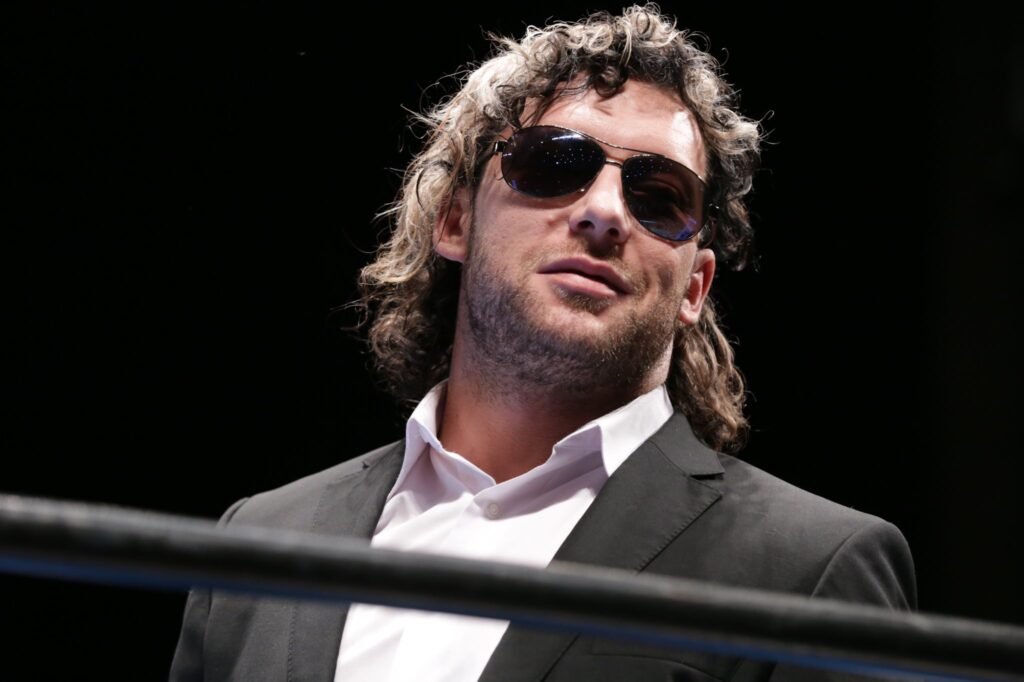
Monthly Puroresu: I would imagine towing that line between getting outside of the box and self-preservation is very difficult?
Kenny Omega: That’s the thing too. I think part of what really helps now that I’m looking back at over a 20+ year career, one of the things that helped me do the things that I’ve done to myself, but continue on today at a pretty high pace and with rough schedule is that I never dabbled in drugs or alcohol. That’s one thing because using drugs kind of creates a short-term detrimental effect on your health. But the one thing that really helped me was a lot of guys were smokers back then. And not being a smoker is what really helped me. I think from my conditioning.
Monthly Puroresu: I mean, you guys that created this new explosive vertical of professional wrestling, because like a lot of 30-somethings, I was never going to watch WWE again. Discovering your brand of wrestling, it kind of brings up the spirits of somebody like me to get in that weight room. So, I just wanted to thank you personally. But for the gaijins coming behind you, do you have any words of encouragement while they’re in Japan to push those limits and continue that self-preservation? Anything in particular that stands out?
Kenny Omega: Anything in particular… the thing is when I was in Japan, I don’t think there’s a way to reproduce what I’ve done. If I were to go back in time and do it all again, I don’t think I can re-trace my footsteps and create the same results. A lot of it was serendipitous. A lot of it was just by dumb luck and opportunity. As well as being the right place at the right time. That always helps.
Monthly Puroresu: But you still have to be you. It still has to be Kenny Omega, with the right attitude. A lot of guys can goes over there thinking “I’m all that.” We started our conversation with that and you never at any time, just talking to you, had that in your head. “I’m Kenny, all right. What do you got for me?” It was never that. You immersed yourself in their culture, you wanted to learn their system. Dojo systems are a family system. That’s why they all sit and eat together and you basically spend all your time together. To basically create that family relationship almost. With anybody over there from the father, Takagi-san, all the way on down. I know that’s one thing we don’t have, and certainly in the U.S. system, that it is so unique to the Japanese dojo system. And you immersed yourself to be able to do that. Not all gaijin can do that. And I think that’s giving you credit to be able to do that.
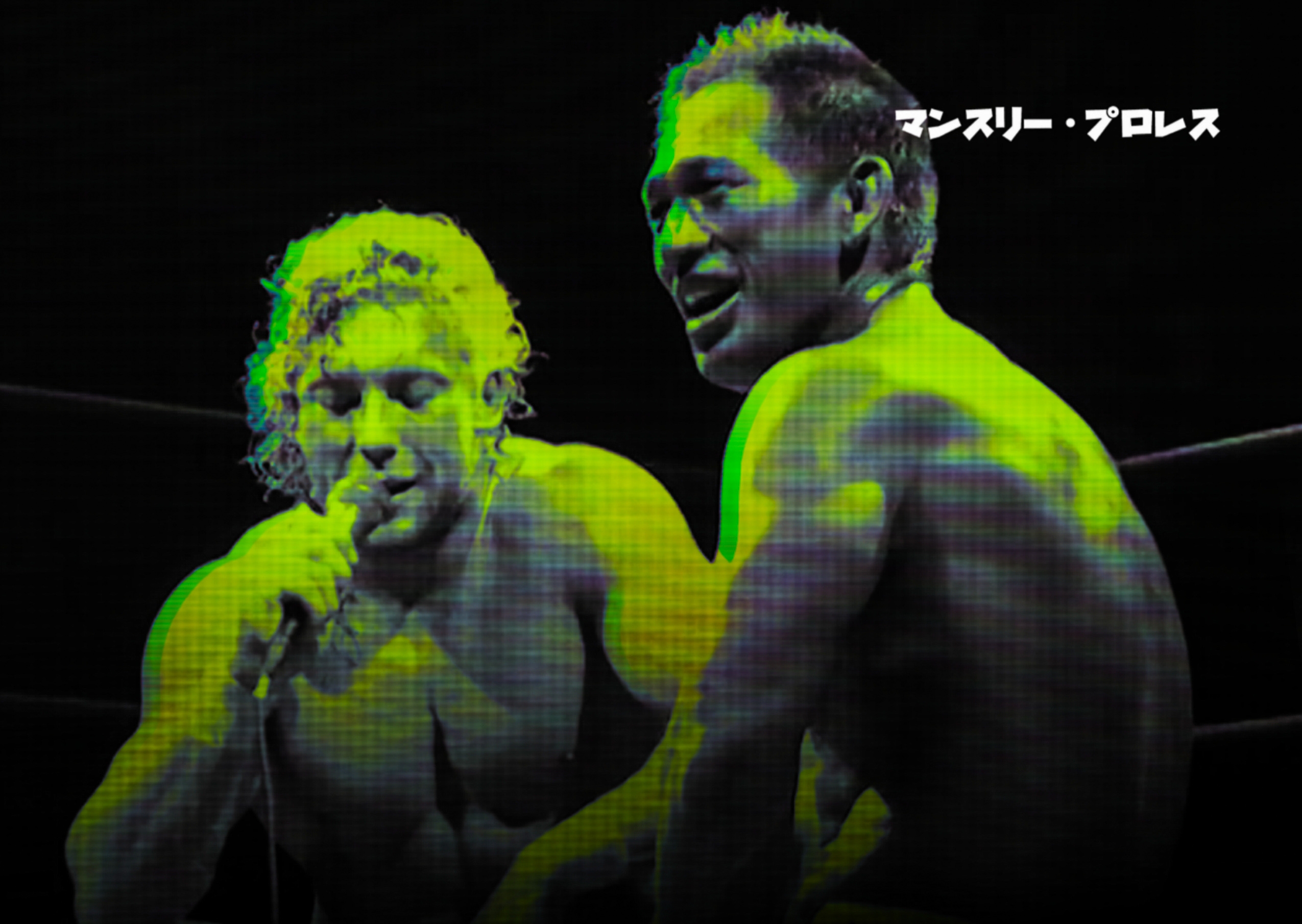
Art c/o Manuel Ish
Kenny Omega: I’m thinking back and I’m trying to put myself back into my old shoes. I remember running into some of the dudes that were in NOAH and in New Japan. And again, they were sort of gifted the opportunity to be there. And there was no feeling of, I need to earn my place. There was no feeling of, I need to do something big to get myself noticed that maybe I can be brought back. Everyone had this air of confidence and a feeling of entitlement where I deserve to be here. And anytime I heard of a squabble between any of the foreign athletes that were there at the time, they’re always arguing about money.
They just wanted more money or saying “I can’t wait for my opportunity to possibly get into WWE. This is my stepping stone to get there.” And that’s totally fine. Everyone’s in wrestling for different reasons. But it really helps and I think it really conveys to the fanbase when they feel that you want to be there and that you are performing from your heart. I remember when I was doing interviews whether it be for SamuraiTV or for ShuPro and Nakazawa would translate everything for me. One time I had a TV interview that kind of fell into my lap where Nakazawa goes “Oh my God. I’m so sorry. I accidentally double booked myself. And I really have to be at my gym to work with a very special client. So you’re going to have to somehow do this without a translator.”
And I remember it was really rough. I remember trying to place myself in the shoes of the fan, watching my broadcast. And if there were a fan how disappointed they might’ve been to not be able to hear what I had to say. Because I’d felt that if I could connect with people, if I could tell them more of what I was thinking, more of what drove me and how passionate I was and how much I cared to be there. If I could just help them understand that and how much I appreciated them to be supporting me throughout my journey. I felt that I could have a connection with the fans that was already better than it was. I was kind of trying to show my appreciation through actions in the ring. But I thought that if I could double that and if I could compound that with my words as well, then I felt that I could make it a brand new connection between the people and enjoy my time in a country that I’ve always wanted to be in.
I made sure to make a real effort from that point on to at least have enough understanding of the language, to handle my own interviews. To run my own birthday events at the DDT bar, where I could speak with our fanbase. I could speak to people, where every time, if I wanted to go out to a restaurant, I would have to call Nakazawa and say “Hey are you free? Like, are you, are you off work? Can you take me to this place?” And I remember he would take me and I could see myself at one point and I hated myself for doing this, I would phase out. When we rode the train, I waited like “Hey, are we there yet? Are we there yet?” And like, “Oh no, it’s the next stop?”
Monthly Puroresu: It’s interesting what Kenny is saying, because everything I’m hearing from you is that you’re unique in a sense – that’s why you’re successful. Of course we all want to be successful. You deserve everything you have now. But one of the most important things that I’m taking from this is that, how you immersed yourself in a culture, and that’s what made you great. That’s why fans genuinely understood that you were trying to communicate, in their language. They appreciate that. “Here’s this gaijin from Winnipeg and trying to communicate with me. So I understand how he’s really feeling by being here in my country.” That goes a long way and I think that’s why you’re successful.
Business wise, I’m sure that helped as well. They could see the value in that, Takagi-san or whoever, further on down the line.
Monthly Puroresu: I think for Kenny and I’m going to say this very clearly… That was the result of it, but that wasn’t his goal. And that’s why he’s successful. He’s being himself, that’s why Kenny Omega successful and you deserve everything he has. Because not everybody can just show up at DDT or a NOAH dojo, and go down and train here. Sonny Onoo’s tryout program, for instance, gives indie wrestlers a scholarship for them to train over there. His new group going over, in 2023 or shortly after, may train with the NOAH dojo. They might train with GLEAT, they might train with ZERO-1. And if there’s a female they may train with TJPW. But at the end of the day, it’s, up to the wrestlers – how bad they want it. Companies are eager to find another Kenny Omega, who understands what this opportunity means. So that’s kind of the story.
And that’s the thing that people in the United States forget. “I’m gonna go to Japan as a stepping stone to get the WWE.”
Kenny Omega: I feel like part of the journey, thinking that when I was originally going to Japan in 2008, was that this could be the end of my wrestling career. And I want to make as much of this as possible. Not only in my wrestling journey to close the book, but also as my journey to becoming a better human being and being Canadian and perhaps not American or some other kind of Western culture, I’m not sure if you know about Canadian culture at all, but we’re just generally very melting pot. You know, we try to, we try to be a very open door to all different types of cultures and now being Canadian. I’m not even sure what that means, because it’s just a mixture of so many types of ethnicities and culture.
I’ve found that when I did go to Japan, sometimes, I don’t want to say all the time and I don’t want to generalize it, but I just want to say sometimes I did feel like people that were coming from a Western culture were feeling like, “Well, we’re the superior culture and we are the superior culture now, what is it that’s entertaining about this culture? And while we’re here, you owe us something. You should be happy that we’re here.” And that’s part of the reason why I could never handle going to a place like Roppongi or some of the nightlife districts in Tokyo, because they’ll get some of the foreigners that come to Tokyo that aren’t treating the land or the culture with respect. They treat it as though it’s their playground.
The last thing that I wanted to do was to take a stance where I was projecting, that where I come from is superior. Where I come from is the higher level. I feel just like with anything, with wrestling, with life, probably the ideal situation is to take the best parts of everything and make it something your own. So with wrestling, Japanese Strong Style, I love it. It’s amongst one of my favorite styles in all of wrestling. However, if I only practice that style, I don’t think I could ever be in a list that’s amongst some of the greats that are considered for being the best. It’s because I keep an open mind to every style. Even if I don’t watch it or study it very often. I definitely want to keep an open mind to what everyone’s doing in other countries, with philosophies and wrestling.
And DDT helped open my mind to that too, is because even though they’re so unique, and even though they’re sometimes misunderstood by other people, there are kind of the epitome of what an open-mind company for my product is all about. So that’s why some of their wrestlers are some of the most open-ended and most versatile athletes in all of professional wrestling. Ibushi being one of those cases. We have another guy in DDT, his name’s Antonio Honda, who I loved to wrestle all the time. Super good in all forms and variations of professional wrestling. Some people who don’t know who HARASHIMA is he’s incredible. Konosuke Takeshita, another guy young up and coming athlete who just came to AEW, blew everyone’s mind. It’s unbelievable because the American thought process is “Well, we know New Japan. How have you not seen this guy in New Japan?” There’s such bigger world out there.
Monthly Puroresu: We’re trying to open that oyster up just a little bit for the readers. Do you think you’ll go back to Japan and work with Takagi-san now he’s in charge of DDT?.
Kenny Omega: I did the one show at Ryogoku Sumo Hall which was incredible. It was an incredible feeling. I can’t put into words what it felt like to go back there and to see so many familiar faces. My mind is blown when New Japan will run a random poll as to ‘Who is the best foreigner of all time in New Japan?’ And then I win it! And it’s like “How?” “You remember me? And you remember me fondly enough to say that I’m that guy?” It’s incredible. So then for me again, this goes back a little bit in 2008, for me with DDT, for those fans. DDT told me, once we announced that you were going to be there and we played that video, our phones were ringing off the hook and we sold this place out just like that.
I was thinking, I could tear up. I talk about it too much, but you remember me from that far ago, like I don’t. I don’t think I could do that in Winnipeg. And that’s where I was born. You know what I mean? But that’s just how special those fans are and they don’t forget. It means a lot to them. It’s special to them. And it’s like you said, Sonny, it’s a real family environment and atmosphere. It’s family, it’s trust, it’s respect, it’s the loyalty. It’s all those positive things that go into the idea that a lot of people have an idea of Japanese culture, which is that honor system, you know, everyone thinks “What is Japanese culture?” They think it’s about samurais, ninjas, and Godzilla.
I say: “Yeah. Sure.” But, if you take some of the things that make those, what they are embedded within those are, are those qualities, is what makes it such a special country. So for that fanbase to remember me and to give me just a real nice homecoming, it was wonderful in 2019. And I would love of course, to be back at some point in time. Whether it be for DDT, for NJPW. I’ve never actually once wrestled for NOAH, but since they’re a part of CyberFight, now it’d be cool to do something.
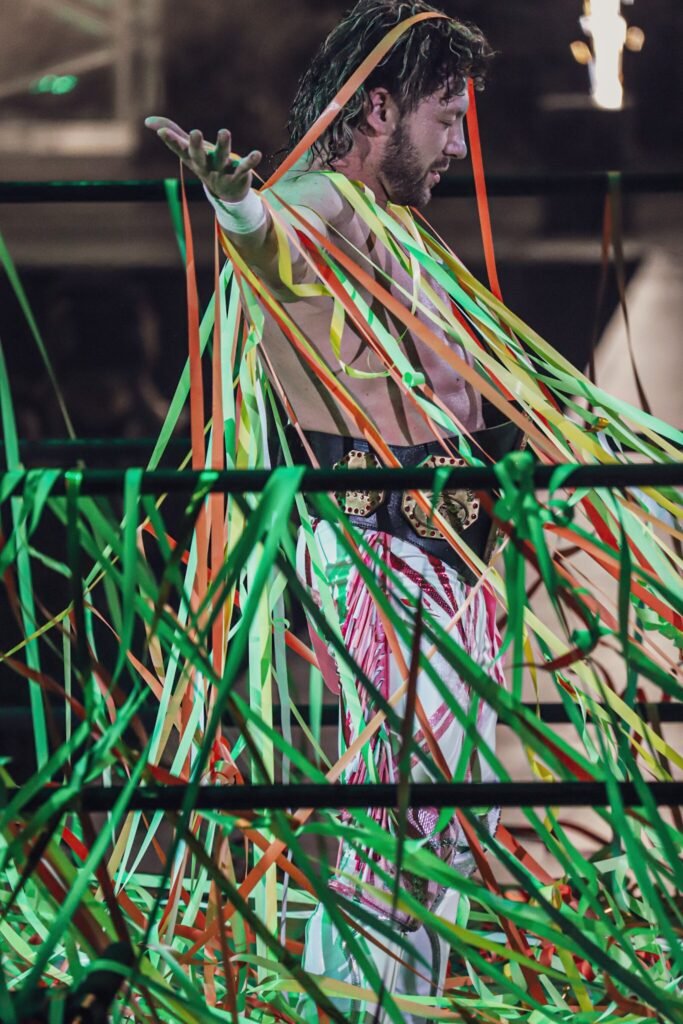
Kenny Omega at DDT Ultimate Party in 2019.
Date:
January 5, 2026